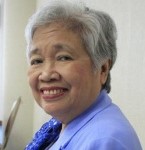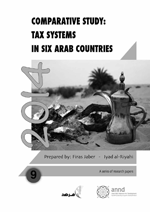Social Watch news
Published on Fri, 2014-12-05 09:54
The UN Guiding Principles, while not perfect, provide the clearest expression yet of the international community’s expectations of the human rights responsibilities of corporations, including private sector banks. The most notable response by the banking sector to date has been the formation of the Thun Group in 2011 to discuss the implementation of the Principles, and their first discussion paper, launched in 2013.
More than one year from the launch of this paper, and more than three years from the launch of the Guiding Principles themselves, a new study released by BankTrack, “Banking with principles? Benchmarking banks against the UN Guiding Principles on Business and Human Rights”, attempts to assess how banks are doing at implementing the Principles into their own operations, policies and reporting.
|
Published on Sun, 2014-11-30 17:32

Prof. Leonor Briones.
|
The budget watchdog Social Watch Philippines on Friday criticized the Senate for retaining the new definition of savings in the 2015 budget that it approved, and the possibility of funding for an expense item being declared as savings at any time of the year.
"Such a redefinition can perpetuate the pork barrel system and mechanisms similar to the Disbursement Acceleration Program, both of which have been declared unconstitutional by the Supreme Court," the group said in a statement.
|
Published on Fri, 2014-11-21 12:35
The Arab NGO Network for Development (ANND), in collaboration with Christian Aid and Social and Economics Policy Monitor Palestine, explore in their comparative study on “Tax Systems in Six Arab Countries” how the tax systems of Arab countries have contributed to the lack of opportunity, growing inequalities, marginalization and exclusion suffered by the majority of people living in the Arab region. The revolutions witnessed by some countries in the region and the instability and crises in others are in part a demonstration of the people’s rejection of these inherent structural disparities. Paradoxically, as the report shows, it is the tax policies of these countries that present one of the key means by which local resources could be redistributed and mobilized to restore socio-economic justice to the poor and to foster more self-reliant development.
|
Published on Fri, 2014-11-21 11:56
Private military and security companies (PMSCs) have become a relevant topic in international relations and in academic literature during the last decades: the case of Executive Outcomes in the 90s, the well-known actions of Blackwater in Iraq, and G4S controversial practices are good examples of this. The controversial collaboration of these companies with the United Nations has rarely been an open discussion, neither in the public sphere nor in academia. However, in recent years, several studies have attempted to illuminate this relationship, including the work of Lou Pingeot.
|
Published on Fri, 2014-11-21 10:32
In a letter submitted to the UN Secretary General, RightingFinance addressed a number of requests in regards to financing aspects of the upcoming Synthesis Report that the Secretary General’s office is preparing as input for the intergovernmental negotiations on the Post-2015 Development Agenda Summit.
The letter makes reference to the human rights audit that RightingFinance carried out on the Intergovernmental Committee of Experts on Sustainable Development Finance report, assessing it from the perspective of international human rights principles including those of maximum available resources, non-retrogression, minimum core, non-discrimination and equality, participation, transparency and accountability, access to justice and access to remedies.
|
Published on Fri, 2014-11-14 14:43
As intergovernmental discussions commence on a major financing for development conference to be held in Addis Ababa, Ethiopia in July 2015, differing priority issues between developed and developing countries are already seen.
The process for the International Conference on Financing for Development (FfD) commenced in the New York headquarters of the United Nations on 17 October 2014.
The third FfD conference, which will be held in Addis Ababa, from 13 to 16 July 2015, will gather high-level political representatives, including heads of state and government, ministers of finance, foreign affairs and development cooperation, as well as all relevant institutional stakeholders, non-governmental organizations and business sector entities.
|
Published on Fri, 2014-11-14 08:44
2015 will be a landmark year for the global fight against poverty and for equitable and sustainable development, with three crucial summits in just six months. A central issue for all three summits is concrete proposals for reforms to international financial and trade systems so that they support the achievement of global sustainable development goals. Such reforms should be based on the right to development for all countries and ensuring economic and social rights for all. There are sufficient funds available to achieve human rights for all, end poverty and to achieve global sustainable development goals: but political decisions to change structures and systems are needed to make this possible. On these issues, the Third UN Conference on Financing for Development (FfD) in Addis Ababa in July will play a critical role. To formulate civil society positions towards this upcoming conference, a coalition of CSOs has compiled a position paper and is looking for endorsements.
|
Published on Thu, 2014-11-13 21:32
Thailand has been seen as a country with high economic development; however inequality in society persists and the income gap has become even wider. Data as of 2009 suggest that, 20 percent of the richest people in Thailand earn 11.9 times more than the 20 percent of the poorest. In 2012 it was found that the rich in the country possess 325.7 times more land than the poor. Reviewing government implementation of the Beijing Declaration and Platform for Action (BPA) has highlighted that the persisting gender discrimination has increased injustice in society for women and this situation is not being well addressed by the government.
The report, coordinated by Foundation for Women and Social Agenda Working Group (Social Watch, Thailand), is a summary from the report of the Thai women’s civil society groups on Beijing +20 review. The review process has provided an opportunity for civil society groups from different sectors, including groups working on issues related to public and private spheres and with diverse groups of women, to come together.
|
Published on Thu, 2014-11-13 19:45
Dilma Rousseff, re-elected president of Brazil, "does not have more options than to get closer to the social movements and to the population during her next term”, says the philosopher Jose Antonio Moroni, member of the Board of directors of the Institute of Socioeconomic Studies (INESC). “One option is that Dilma is going to govern with people in the streets supporting her steps in the reform process that the whole world wants or she is going to have people against her", Moroni argues.
Dilma´s first government was „extremely technocratic ", says Moroni, with only few links to society. If Dilma repeats that strategy she will face a difficult time with the current Congress.
|
Published on Thu, 2014-11-13 18:49
‘You don’t understand!’ was World Bank’s Grahame Dixie’s rebuttal of the accusation that the Bank bears heavy responsibility in the grabbing of land and natural resources by corporations in the developing world. Having heard first-hand testimonies on the tragedy of land grabbing and related human rights violations in Africa, Mr. Dixie insisted that his institution was against land grabs but nevertheless the development of agribusiness in Africa was a necessity to feed a growing population, particularly in urban areas.
This discussion took place on October 10, 2014 at the World Bank headquarters in Washington D.C. during an event organized by the Oakland Institute on the impact of the Bank’s business indicators. The panelists from Kenya, Ethiopia and Mali pointed out the role of the institution in shaping policies and programs that lead to displacement and dispossession, destruction of lives and livelihoods, denial of basic human rights and repression for those who oppose the theft of their land by agribusinesses.
|
SUSCRIBE TO OUR NEWSLETTER
Submit

|










